- Home
- Roger Smith
Nowhere Page 10
Nowhere Read online
Page 10
The windscreen and two of the side windows had been shattered.
She stopped a moment and felt the breath leak from her and she felt as flat as one of those slashed tires.
A movement to her left had her spinning, expecting an attack, but she saw a black security guard, a skinny shadow inside a gray uniform, standing outside a shuttered store, a German Shepherd sprawled like a throw rug on the concrete at his feet.
When she stepped toward them the dog lifted its head and panted and then collapsed again.
“Did you see who did this?” Sue asked in English.
The man just stared at her.
When she repeated herself in Afrikaans he shook his head and said, “Ek sien niks, missies.”
I see nothing, missy. Using the old Apartheid-era term of respect.
Sue knew he was lying, that he was too terrified of the white thugs who had done this to speak out.
She unshouldered her pack and removed the selfie stick, attaching her cell phone and then telescoping it.
When she started filming the car the guard hauled his asthmatic dog to its feet and dragged it away, unwilling to be implicated in white peoples’ mess.
Once she had enough footage of the car Sue stepped into the shot with the Nissan in the background and started to sing what she’d sung for Tjaart back in Cape Town, the old song that idealized the Kalahari.
She started off a little uncertainly, then she channeled her rage and in a strong, clear voice she sang about the endless plains and the thorn trees and the peaceful land. Sang about the oxen and the cicadas. She was reaching the end, belting out “this is our country, Kalahari” when she heard shouts from the bar and turned to see two fat men in their fifties, wearing shorts and khaki shirts, hurling abuse at her.
When she swung the lens on them they shook their fists but evaporated back into the bar.
As she finished the song she heard slow, ironic clapping and saw Disaster Zondi standing on the sidewalk, near where the guard had been posted.
“Very pretty,” he said.
“The song or the car?”
He looked at her Nissan and dragged down the side of his mouth.
“A nice warm Boer welcome?”
“Ja.”
He eyed her backpack. “You’re leaving?”
“I was.” She shrugged. “Now it looks like I’ll be sticking around a while.”
“I’d tell you to be careful but you seem to have other ideas,” he said.
“I’ll try and keep a low profile,” she said.
He gave her a look of mild amusement and said, “Sure. Well, goodnight.”
“Ja. Don’t let the bed bugs bite.”
“My ass’ll tell you that's not a joke,” Zondi said and disappeared around the corner.
THREE
Zondi was walking through the dingy hotel lobby toward the stairs, the yellow ceiling bulbs throwing a liverish light over the tired furniture and the night man snoring behind the desk, when he heard the noise coming from the bar.
Surrendering to an impulse he turned on his heel and went toward the barroom, pausing in the doorway for a moment.
It was your standard South African watering hole. Unchanged in fifty years. A wooden counter. An old TV set mounted on the wall, tuned to sport. The room smelled of stale alcohol and sweat.
The four men who propped up the bar counter hadn’t changed much either. Big. White. Dressed in khaki. A couple of them bearded. All of them smoking, in defiance of the law. Zondi had no way of knowing if they were acolytes of Kruger’s or just farmers out on the town.
As he crossed and seated himself on a stool the laughter died and the men stared at him. The bartender, also a beefy white man, paused his conversation with the quartet of drinkers and pushed himself back from the counter and came over to Zondi.
“Ja?” he said.
Zondi looked past his ruddy, sweaty face at the bottles behind the bar, suspended snout down in pourers. The only whiskey he spotted was a bottle of White Horse.
“I’ll have a Scotch,” he said in his most fluent Afrikaans. “Double. Two blocks of ice.”
The bartender looked at him and then across at the white men, shrugged, and poured the drink, shoving it across the counter at Zondi.
“Thirty-two fifty.”
Zondi gave him two twenties and the man made change, smacked it down on the bar counter and went back to the men and the conversation started up again. They were talking about rugby, a game that Zondi had never followed.
Zondi sipped his drink, feeling the burn of the liquor. He was a single malt man, but this would have to do. And it would take away the unpleasant aftertaste of the meal he’d eaten in the same Wimpy bar where he’d spoken to Sue Kruger earlier. A burger and fries that sat heavy in his gut. The Wimpy had served no alcohol, so he’d had to wash it down with a soda water.
Zondi thought of Sue Kruger, trapped now in this town—probably upstairs in her room—and he entertained the notion, for just a moment, of buying the bottle of Scotch and seeking her out.
“Hullo, my friend.” Zondi looked up at a huge, bearded man in his forties who loomed over him. Probably six foot five and two-fifty pounds. “Mind if I join you?”
Zondi shrugged. “It’s a free country.”
The man laughed. “Ja, that’s what they say, hey?” He sat, the proximity of his overheated flesh unpleasant. “Where you from?”
“Johannesburg.”
The man raised his eyebrows. “Jo’burg, hey? Joeys. Never been there.” Zondi sipped his drink. “You here for the Magnus Kruger thing?”
“Yes.”
“And you’re what? A journalist?”
Zondi shook his head. “No. An investigator.”
The man widened his eyes. “A cop, hey?”
“Ja, kind of.”
“You dress nice for a cop.”
“Thanks.”
The man eyeballed him and then sniggered. “None of the local cops would have the balls to come in here.”
“That right?”
“Ja. They know their place.”
“Good for them.” Zondi drank. “Don’t blame them though.”
“Ja?”
“Ja, it’s a shithole.” He stared at the giant.
The other men showed their displeasure, and one of them said, “Moer hom, Alwyn.”
Hit him.
Alwyn mused for a second. “Can I ask you something, my friend?”
“I’m not your friend.”
“No, you’re right. You’re not. Sorry.” He sniggered again. “Why don’t you and your ANC do something about these farm murders?”
“It’s not my ANC.”
“You don’t support the government?”
“No.”
“Really? Why not?”
Zondi looked at him. “Because they remind me of your old lot. Corrupt. Self-interested.”
The man narrowed his eyes, focusing his glassy stare. “But you work for them?”
“I work for the people of this country,” Zondi said, the stock reply sounding both pompous and tired to his ears.
“So you work for me?”
“Yes.”
“Really?”
“Yes.”
“Then go outside and wash my truck.” Alwyn laughed and his friends joined in. So did Zondi. Then the big man leaned closer. “But, serious? Why is nothing being done about these farm murders? Because the victims are white?”
“That’s outside my jurisdiction.”
“Ja?”
“Ja.”
“And what then is your jurisdiction?”
Zondi ignored the question and finished his drink and rose, heading for the toilet. He stood at the stinky urinal taking a piss he didn’t need, his instinct telling him that giant would follow. He did, filling the space behind Zondi.
“Listen,” Alwyn said, “you heard about George Maritz? Over at Soetwater?”
Zondi shook himself dry and walked to the basin, eyeing the big man in the disco
lored mirror as he washed his hands.
“Yes.”
“Now George was my friend and it really gets me that bugger all is being done about what happened.”
“What needs to be done? The man who killed him is dead, isn’t he?”
The big Afrikaner came in close.
“The whole fuckin thing stinks, man. George was softhearted. Treated his workers like bloody royalty. Most of the town, like them in there,” he jerked his head toward the bar, “called him a kaffirboetie.” A darkie lover. “Why would anybody kill him?”
“Robbery?”
“What? A cell phone and a couple of rand? No ways.”
Zondi turned to him. “What then.”
“Listen, lot of the guys who been murdered around here believed in the old ways. Like me. One of my kaffirs killed me, nobody would be surprised.” He shrugged. “But George? Nah. It fuckin stinks. That bitch wife of his knows more than she’s saying.” He got in even closer. “Local cops won’t do nothing.”
“Why should I be any different?”
“Dunno. Maybe you still give a shit. Or am I wrong?”
When Zondi didn’t reply the bruiser turned and went out through the squealing door. Zondi heard a burst of laughter and left the toilet and walked out of the bar without a backward glance.
FOUR
Steve Bungu, at the wheel of his SUV, cruised toward Sea Point listening to CapeTalk to check if there was any blowback from his little taxi action earlier.
He had his sources within the cops, of course, and so far it was going as he’d planned, heads were being shaken, and officials were saying it was just another tragic chapter in the ongoing taxi war, but talk radio—and the irresistible lure of a few seconds of fame—drew out the crazies and the idiots like a poultice on a butt boil, but it also attracted the anonymous eyewitnesses who (for reasons of their own) avoided the cops but would spill their guts on the airwaves.
So far there had been no shocks, and conversation drifted to the murder of the president’s wife.
Yack, yack, yack. Bungu listened with half an ear, letting the gabble wash over him.
This fuckin country.
Addicted to talk.
Apartheid had been talked away. The old regime’s slaughterers had been invited to sit at the Truth Commission and tell their horror stories and swear contrition as wizened black mamas in blankets had tried to make sense of how these men had beaten their sons to death in prison cells, tortured them and blown them apart and hidden their bodies in the remote veld.
Bungu was spinning back decades now, not hearing the radio at all, hearing the voices in his head—his own incessant talk show, one that couldn’t be switched off—and when he came back to the here and the now he realized he was searching the sidewalks for the hooker he’d picked up a few nights before.
The mouthy one.
He spotted her, outside an apartment block just off Glengariff, but thought he was out of luck because she was leaning down talking to some white guy in a Lexus. Then the Lexus pulled away leaving her on the sidewalk and Bungu slid to a halt, reaching up and clicking off the dome light.
The hooker stood and stared at him, firing a cigarette, but he didn’t see her he saw Nandi, even though she’d looked nothing like this dollied up tart. He sat with his hands on the wheel, feeling the vibrations of the smoothly idling German engine, then the shakes hit him like a blow from nowhere and he had to grip the wheel hard to stop his body from convulsing, and cold sweat sprang from the lunar craters of his skull
The door was open and the woman was saying, “So you’re back?”
He nodded, words unavailable to him. The lights of an oncoming car traced the contours of his ruined face and the sweat trickling from his brow.
The hooker said, “You okay?”
“Ja,” he said, finding a rough facsimile of his voice. “Get in.”
She hesitated before she climbed up beside him and shut the door.
Her presence—sweat and stale sex and hairspray and cheap perfume—earthed him and he was able to unclench his hands and shift the SUV into gear and pull out into the traffic that sucked him along Main Road.
“So,” she said.
“So.”
“You gonna tell me a story tonight?”
“Ja, maybe I will,” he said, calmer now.
A red light got them and he dug into the pocket of his check shorts and pulled out a wad of banknotes, dumping them in the hooker’s mini-skirted lap.
“Wow,” she said, weighing the cash, “must be some fuckin story.”
“It is.”
He turned down toward the ocean and drove along Beach Road.
“So,” she said, “I’m all ears.”
“Just be quiet,” he said. “Please.”
She shrugged and he heard the rustle of the cash being stashed in her purse.
He pulled into the car park near Rocklands Beach and parked the SUV so that it faced the ocean, the lighthouse sending out a probing finger into the dark.
He closed his eyes and saw his wife’s face with a vividness that nearly gutted him, the memory almost holographic in its detail.
Bungu opened his eyes and stared out at the dirty slice of yellow moon like a rip in the sky over the ocean.
“They used to call us the warthog and the gazelle, back in the day, me and my wife,” he said, talking to himself more than to the woman beside him.
“Is this like some African story?” the hooker asked. “With mud huts and stuff?”
Bungu wheezed a laugh. “No. No, it’s not.”
“Pity. I like stories like that.”
“Jesus, don’t you ever shut up?”
“Only when I got a cock in my mouth.” She saw his face and choked off a humorless, braying laugh and said, “Shit, sorry. I’m just nervous, like.”
“Why?”
“I dunno. You.”
“Me?”
“Ja. You a scary fuckin guy.”
He realized how he must appear to her, with his pit bull eyes and fists like sides of beef.
“Relax. I’m just gonna tell you a story and then I’ll take you back. Okay?”
“Okay.”
“How old are you?” he asked.
“Why?”
“Just answer the fuckin question.”
“I’m eighteen.”
“And I’m a natural blond. Come on, tell me.”
“Okay, twenny-six.”
“Then the story starts before you were born. Mid-eighties. Apartheid days.”
“You’re not gonna tell me no political story, are you? Politics is boring.”
“Jesus,” he said shaking his mighty head.
“Sorry,” she said, “I’ll shuddup.”
“It’s a love story,” he said. “I’m going to tell you a love story.”
“Honest?”
“Ja.”
“Okay, I like me a nice love story.”
He settled back in his seat. “We met when we were students, me and my wife. Still in our early twenties. I couldn’t believe she’d even look at a guy like me so I married her chop fuckin chop.”
“Sweet.”
“Ja, it was.” He smiled to himself. “But we were student radicals. You know, anti-Apartheid. Nandi, that was my wife’s name, she was fearless. Spoke out. Took on the cops. We got in deeper and deeper and they got us, of course, the security police. Took us to their headquarters for interrogation. Kept us separate, wanted us to name names, give up our network. I knew Nandi would never speak and I kept my mouth shut too. Went on for days. They hurt me bad. Electrical shocks. Beat me. Broke my ribs. Broke my leg. Dislocated my shoulder. Left me deaf in one ear and half blind in one eye. But I said fuck all.”
He paused, staring at that moon, feeling the hooker’s eyes on him.
“One night they brought me to Nandi’s cell and they asked her questions and she just said ‘fuck you, fuck you, fuck you,’ until they cut out her tongue and raped her bleeding mouth.”
H
e heard the suck of the woman’s breath but he didn’t look at her.
“I wanted to talk then, but even with what they were doing to her I knew she wanted me to shut up. Stay silent. So I shut up and they brought me back to my cell and later they dumped my wife’s body in with me for one very long week.” He paused. “I went into a place far, far away for those seven days. So far away they knew it was useless. Either they had to kill me or let me go, so they let me go. Still don’t know why. Wish they’d fuckin killed me.”
He shut his eyes and sat back in his seat, exhaling long and slow, feeling the weight lifting from him as he ended the story. But he knew it wouldn’t be long, a few days at best, before his head filled up once more, crammed with the words, and he’d have to do this again.
“That’s like all true isn’t it?’ the hooker asked, the bravado gone from her voice.
“Yes,” he said. “It’s all true.”
“Jesus.”
They sat a moment in silence before she spoke again.
“Me, I’ve had a pretty shit life, you know?”
“I believe you,” he said.
“But, fuck, what you just tole me . . . Man, how do you live with that?”
“You don’t.”
“You never talk to, like, a shrink?”
“No,” he said. “I don’t do shrinks.”
“Well, then, what about a priest or something?”
“What happened to me didn’t leave me with much faith in sweet baby Jesus.”
“So you come to us? The whores?”
“Yeah, my rancid little sisters of mercy.”
She thought a while then nodded.
“Oh, okay, I get it.”
“Get what?” he asked.
“You need to talk but you can’t talk to somebody who can fuckin hear you, right? Can only talk to somebody so fuckin out of it they can’t hear shit?”
“Maybe,” he said.
But she was right. She’d nailed it.
“But I heard you. Wish I fuckin hadn’t, but I heard every fuckin word.”
“I know you did.”
“So, what you gonna do now? Kill me?”
He looked at her and saw she wasn’t joking.
“No, I’m not going to kill you.”
He started the car, reversed and drove out into Beach Road.

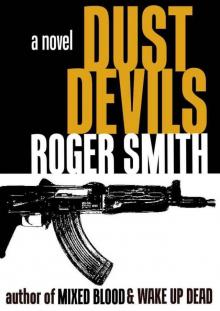 Dust Devils
Dust Devils![[2013] Sacrifices Read online](http://i1.bookreadfree.com/i/03/19/2013_sacrifices_preview.jpg) [2013] Sacrifices
[2013] Sacrifices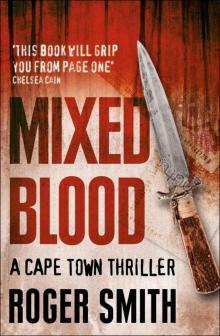 Mixed Blood
Mixed Blood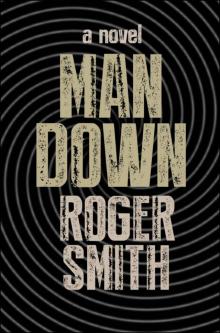 Man Down
Man Down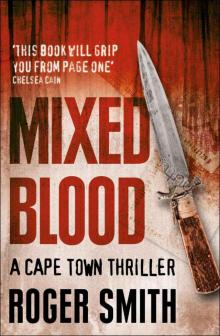 Mixed Blood ct-1
Mixed Blood ct-1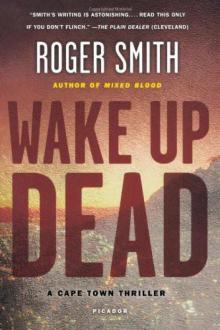 Wake Up Dead: A Thriller (Cape Town Thrillers)
Wake Up Dead: A Thriller (Cape Town Thrillers)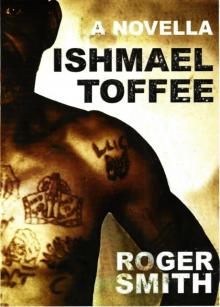 Ishmael Toffee
Ishmael Toffee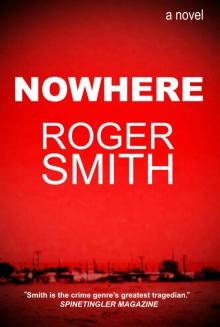 Nowhere
Nowhere Sacrifices
Sacrifices